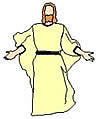| Admin |
| Home Contents email |
| H&S Policy Safeguarding |
| The Church in the World |
| Faith / Church |
| Things Past |
| People & Features |
Christianity Explained
.
What is God Like?

Frequently Asked Questions
| Is this the way you repay the Lord... is he not your Father, your creator? (Deut 32:6).
You are my Son, whom I love (Mark 1:11). And the Spirit of God was hovering over the waters (Genesis 1:1). To explain all these differences, it occurred to the early Christian thinkers that there are three 'parts' of God compared to a human being, which together make up the single whole. (Return to top) |
 |
The word 'Trinity' itself is not found in the Bible, but the Bible does describe the concept if we look - There is one, and only one God but:
1) He is described as 'Father', eg: on several occasions Jesus refers to his 'Father in Heaven'.
2) Jesus is described as God's Son, eg: when he was baptised and came up out of the water a voice was heard from heaven saying 'This is my Son'.
3) God's Spirit is described separately, eg: Jesus said he had to return to heaven in order to send the Spirit, who would 'Lead you into all truth'. (Return to top)
| Jesus referred to the Father many times:
Our Father in heaven, hallowed be your name. (Mat 6:9). Father forgive them, for they do not know what they are doing (Luke 23:34). Don't you know me.... anyone who has seen me has seen the Father (John 14:9). I am in the Father and the Father is in me (John 14:9). (Return to top) |
 |
Christians therefore consider it right to call God 'Father' and associate the Father particularly with the original and ongoing act of creation. Jesus often spoke of, and prayed to, his 'Father in heaven' as separate from himself, so that Christians understand God the Father and God the Son (Jesus) to be separate 'parts' of God. For instance, when talking to his disciples about when the end of the world will come, Jesus replied, "No one knows about that day or hour, not even the angels in heaven, nor the Son, but only the Father" (Matthew 24:36). (Return to top)
| Jesus said: No one knows the Son except the Father (Mat 11:27). No-one knows about that day or hour, not even the angels... nor the Son (Mark 13:32). John The Baptist said: I have seen and testify that this is the Son of God (John 1:34). (Return to top) |
 |
However, God loves us so much that he wants to correct that rift and re-instate the relationship. Unfortunately humanity has never been good enough, God alone is good enough to make good the rift, so he had to come to earth himself in the form of a Son, Jesus Christ. (Return to top)
The Bible, tells us that God himself called Jesus 'my Son' (You are my Son whom I love - Mark 1:11) and his immediate followers recognised him as such (Then those who were in the boat worshipped him, "Truly you are the Son of God" - Matthew 14:32). Christians associate the Son particularly with salvation - that is, saving us from the inevitable outcome of separation from God because of the rift caused by our disobedience, which we call 'sin'. (Return to top)
| At the creation of the earth, "The Spirit of God was hovering over the waters" Genesis 1:2). Jesus said "How much more will your Father in heaven give the Holy Spirit" (Luke 11:13). "You will receive power when the Holy Spirit comes on you... and be my witnesses! (Acts 1:8). (Return to top) |
 |
Christians associate the Holy Spirit particularly with continuing to interface between God and humanity to this day, assisting us by comforting, teaching, leading, inspiring and interpreting God's wishes and words. Some of the ways in which the Holy Spirit helps today is described in the Section 'The Fruits of the Spirit', click here. (Return to top)
| The Christian concept of Trinity maintains that all three parts are equally important, no part is more important than another, all three parts are God so all are of the same 'substance', all three parts are eternal - they have and always will exist, no one part created the other, or is more or less important than the other. (Return to top) |
 |
It's clear from this and similar arguments that God is infinitely more clever than humans. That's understandable - after all God is not human, he's God - and we only have our limited human brainpower and language to describe him. It doesn't seem right to describe God as 'it' or 'thing'; the highest intelligence described by our language is the 'person', so God is described as 'three persons in one God' - Trinity. (Return to top)
 St Mary's Church, Dymock
St Mary's Church, Dymock